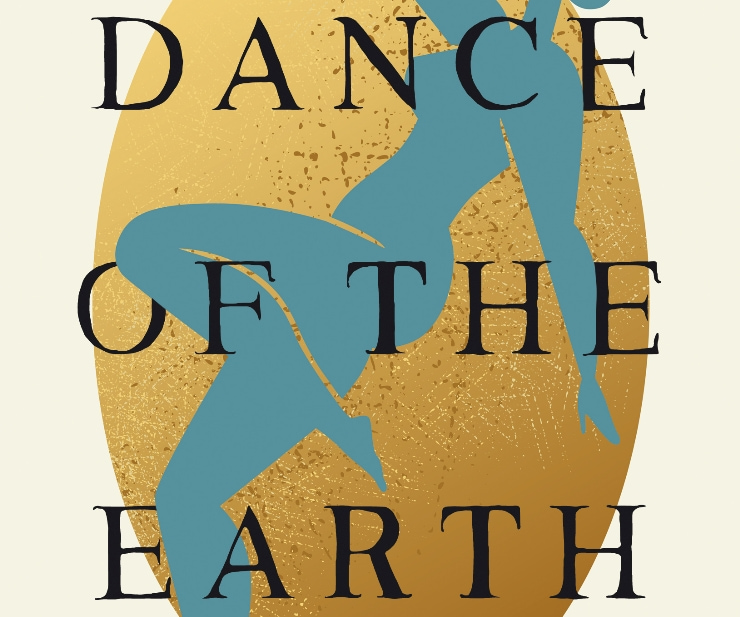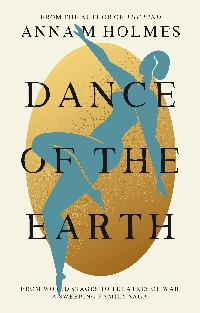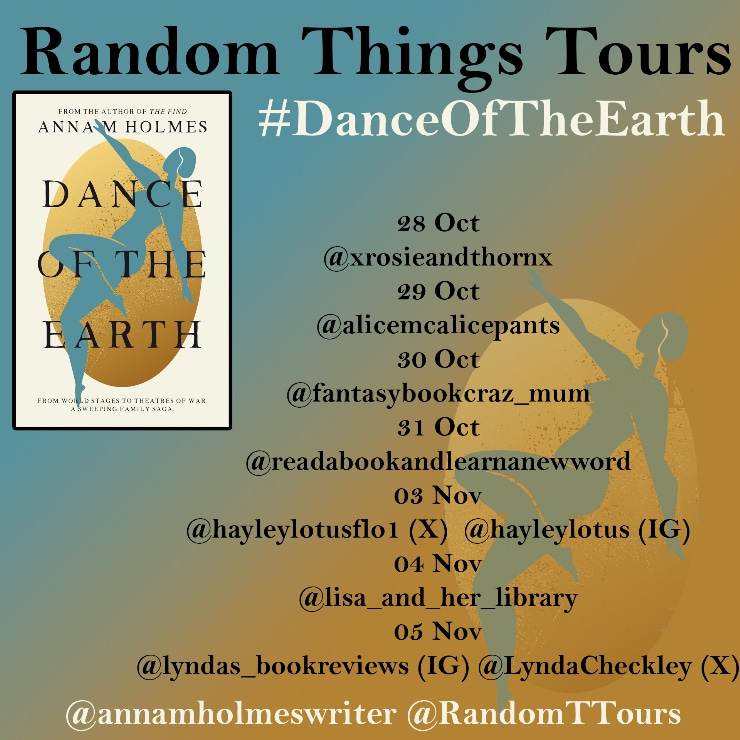Blog tour: Dance of the Earth by Anna M Holmes

This post is part of a blog tour organised by Random Things Blog Tours. I received a free copy of the book in return for an honest review.
‘From backstage to centre stage and theatres of war, Dance of the Earth is a sweeping family saga.
‘Set against the backdrops of London’s gilded Alhambra music hall, Diaghilev’s dazzling Ballets Russes, and the upheavals of the First World War, Rose and her children, Nina and Walter, pursue their ambitions, loves, and dreams. Dance and music become both sanctuary and self-expression, shaping their identities and helping each of them find their place in the world.
‘Spanning the years 1875 to 1921 – an era of profound artistic and social change – fact and fiction interweave in this tapestry of birth, sacrifice, and renewal. Art – both serious and comic – is at the story’s beating heart.’

Dance of the Earth, by Anna M Holmes, tells the story of foundling Rose Banbury, her adoptive mother, Molly, and Rose’s twin children, Nina and Walter, from 1875, when Rose turns up in a basket at the stage door of London’s Alhambra Palace Theatre, to 1921, when the twins are in their mid-twenties.
While Molly, Rose, and Nina’s lives centre around the exciting world of the theatre – whether that’s working on dazzling costumes behind the scenes, or dancing on the stage itself – Walter grows up in his married father Arthur’s middle-class Home Counties realm of music lessons and boarding school, before being reunited with his birth family as a young adult.
Alongside the principal and supporting characters, we experience euphoric highs and devastating lows, with the changing political, social, and artistic landscape of this period, including the First World War, presenting both opportunities and challenges they could never have anticipated.
I found Dance of the Earth really absorbing. I’m always captivated by stories about ballet dancers – perhaps because I couldn’t get much further from being one myself! – and this was no exception. I just love reading about the hidden life of the theatre, and the hard work and dedication it takes to build a successful career as a dancer.
The book is full of vivid, detailed scenes that the author clearly took a great deal of care over. Accordingly, I found it very easy to picture the settings and characters, and quickly became attached to them, sharing in their highs and lows and wanting to see where the plot took them next. This was particularly true of Walter’s ordeal in the trenches: this episode is necessarily graphic and difficult to read, and made my heart absolutely ache for him.
In fact, while he has his flaws, just as his mother and sister do, shy, sensitive Walter was the character I felt the most drawn to and interested in. I felt a lot of sympathy towards him as I watched him experience a great deal of emotional turmoil as a child and young man, including his realisation that he’s attracted to men, at a time when homosexuality is not only abhorred by society, but illegal.
It was also fascinating to see the contrast between Walter and Nina’s personalities and upbringings, raising questions about nature versus nurture, and backing up the findings of my thesis that the experiences of only children (as the twins effectively are during their formative years) at this time were bound up with their social class and where they lived!
Another contrast that struck me was between Molly and Beatrice – the wife of the twins’ father, who is unable to have children herself, and agrees to adopt Walter because Rose can’t cope with two babies. While both women take in children who aren’t theirs by blood, Molly forms an unbreakable bond with Rose, whereas Beatrice never fully accepts Walter, and ultimately rejects him with shocking coldness.
The choices and opportunities available to women during this period is a theme that runs throughout the book. Rose’s birth mother is surmised to have been unmarried with no means or support to raise a child, leaving her with no other option but to give her baby up as a foundling. When Rose gets pregnant outside of wedlock, she finds that Arthur won’t leave Beatrice for her, and her promising career in dance withers away. While the advent of widely-available contraceptives gives Nina more control over her fertility, they aren’t completely fail-safe.
Doors open and close for the women characters in other ways, especially in the case of the younger generation. Becoming part of Diaghilev’s Ballets Russes means Nina gets to see a bit of the world – at least, until the War disrupts everything. She gets into a co-habiting relationship with Charlie, a Black American musician, but he’s thinking of returning to America, where intolerance of inter-racial relationships is on another level. Her friend Edith, meanwhile, goes from campaigning for women’s suffrage, to war work, to promoting workers’ rights.
Dance of the Earth is immersive, detailed, and very moving.
